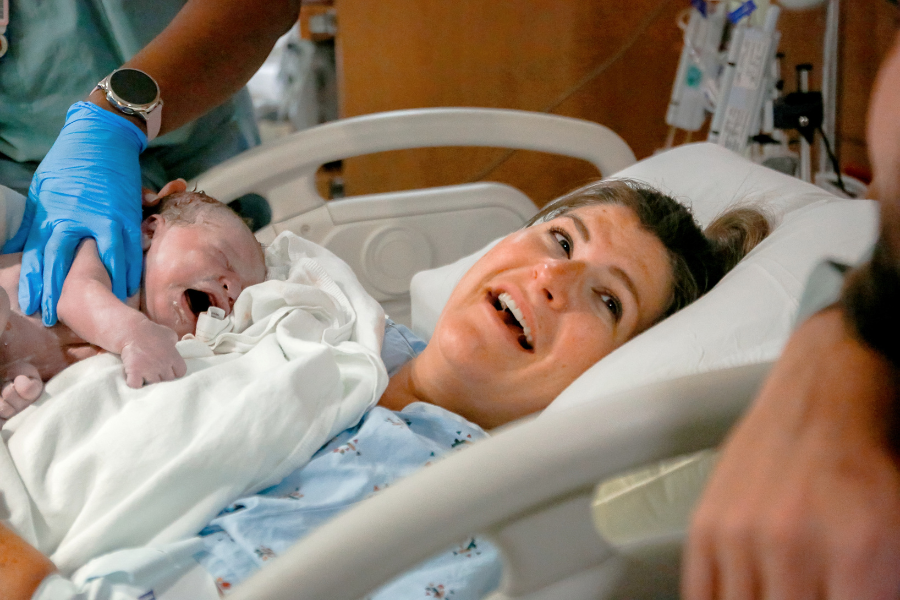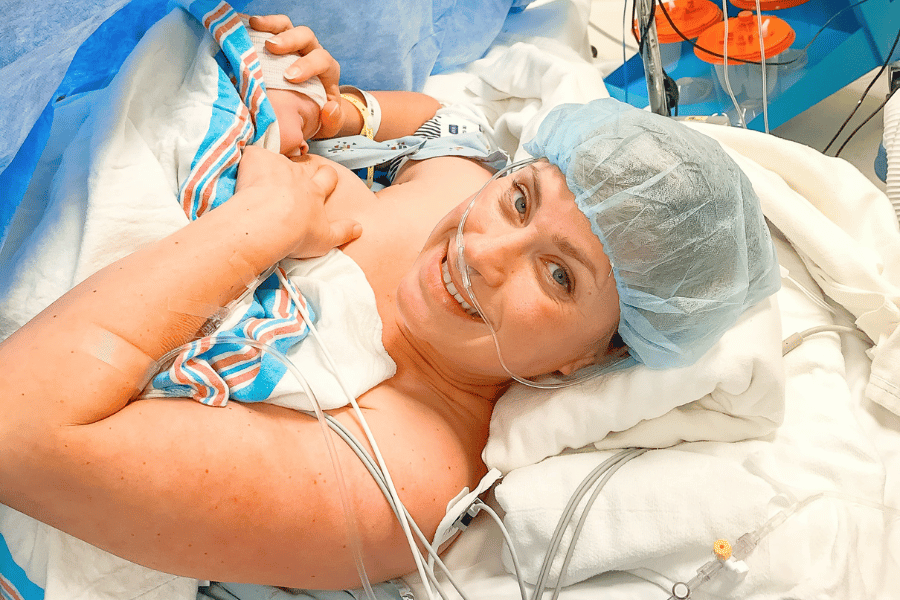Here’s the truth, mama. There’s a ton of information out there about breastfeeding nutrition.
What foods you should eat while breastfeeding and what foods to avoid while breastfeeding is the general topic of about a BILLION sites and books.
But sometimes the information gets crossed and it can be hard to sort out the info you really need. What’s a mama to do?
Well, you’re in the right place! Here we’re going to talk all about breatfeeding nutrition, healthy breastfeeding snacks, foods to avoid while breastfeeding, the best breastfeeding foods, and more!
Follow @mommy.labornurse on Instagram to join our community of over 650k for education, tips, and solidarity on all things pregnancy, birth, and postpartum!
What should I eat while breastfeeding?
You shouldn’t need a special breastfeeding diet or breastfeeding food chart to keep yourself and your baby stocked to the eyes with the good stuff.
That said, breastfeeding nutrition can be complicated. It would be nice to think you could just say “Hey, I like x so I’ll just KEEP EATING X! If I like it, if I survived on it before baby, it should be enough for baby AND me, right?”
Generally, that’s true, unless you lived on ramen noodles and beer before. But it would be silly to think that eating for two is the same as eating for one.
Don’t worry though, mama. I’m gonna try and pare it down for you.
The reality is that your doctor is going to know very best here, so be sure to have REGULAR conversations about your baby’s weight and your challenges breastfeeding.
Breastfeeding nutrition guidelines
I’ll get super specific as you roll on through this article, but here’s the nitty-gritty, mama! Breastfeeding nutrition requirements will vary a little, but there are some things that are ALWAYS true.
The following are breastfeeding nutrition facts that have undergone a fair amount of study. Knowing how you metabolize this stuff is really good, and that’s where a breastfeeding nutritionist could help with great advice and education.
If you’re reading ahead and you’re still pregnant, KUDOS for getting a head start mama!
Maintain energy while breastfeeding
When it comes to breastfeeding nutrition, your biggest warning sign is ENERGY. You get your energy in the form of Calories (kcals). All that stuff about “increase your calories” or “decrease your calories” is talking about these little dudes.
You get calories from incomplete proteins (cereals and rice, fruits and veggies) and complete proteins (meats and dairy) when your body doesn’t have enough of the incomplete proteins. You also get energy from fats.
You’re basically using the same amount of energy the first 4 months of breastfeeding as you did putting that little one together inside your bump. Because of that, your breastfeeding nutrition requirements shouldn’t change significantly these first few months, but definitely don’t go back to those pesky bad pre-pregnant-you eating habits.
Most doctors and lactation consultants will still probably recommend you increase your diet these first four months, rather than maintaining or decreasing.
Starting around 4 months, that little monster is going to start doubling up on birthweight. If you want to keep up, you’ll NEED about one extra meal (500 Calories/kcals) per day.
Carbohydrates for breastfeeding
This is where you get your energy, lady. We try so hard to avoid carbs in some diets and completely avoid them in others.
You get about 55% of your energy from carbs, and being short of this breastfeeding nutrition requirement is the fastest way to lose your energy.
Stock up on grain products like bread, rice, quinoa and cereal. Opt for whole grains for a healthier, complex carb that will keep you fuller longer. And don’t forget the oatmeal which can help increase milk supply, too.
You should also fill the fruit basket and get that crisper crisping all your favorite veggies – which are both healthy sources of carbohydrates (and sugar!).
Proteins for breastfeeding
If you’re low on carbs, say goodbye to your body-building career. At least while breastfeeding. All the meat and eggs and tofu in the world won’t give you muscle mass if you aren’t supplementing it with carbs, because your body will break the protein down for energy.
Since building muscle MIGHT not be your primary concern while breastfeeding (although your little one might like some), think more about enzymes, hormones, and antibodies. Other than muscle mass, THESE are what your body uses the protein for if it’s properly packed with good carbs for energy.
For this reason, mix good carbs with great proteins so your body gets the appropriate balance to maintain amino acids and energy.
Fats for breastfeeding
Fats help your body absorb and transport vitamins in your diet (specifically the fat-soluble ones–which basically means they can hop on board and ride your fat cells like a little pink pony–more or less).
Because it’s more of a vehicle and less of a passenger, limit fat to about 30% of your diet. Try to make it equal parts saturated (from things like meat), polyunsaturated (from veggies and nuts), and monounsaturated fats (from the fishies).
Listen to your body for signs you’re getting the right breastfeeding nutrition
Fact is, lady, all new mamas are tired.
How tired you are can be a hard signal to interpret in all of this. But there’s a limit to how exhausted you should be–it should be the NATURAL exhaustion of a lady whose life has been rocked to its foundation and maybe she also possibly didn’t get enough sleep.
In my personal experience:
- if I focus on proper hydration and nutrtion my newborn-mama tiredness is totally manageable (the human mama is made for this after all)
- BUT if I eat junk all day and don’t remember to drink enough water I yawn literally all day and can hardly keep my eyes open
Once you kind of cue into it, you’ll TOTALLY notice you feel less tired when you’re eating right even if the amount of sleep you’re getting doesn’t change.
When to contact a breastfeeding nutritionist?
If you feel unwell before or after breastfeeding, talk through that with your partner and your doctor. Doc will know best when and why you’ll need to contact a breastfeeding nutritionist. More often than not, your doctor will have all the information you need anyway.
Other reasons you may need to turn for help is if you are experiencing extreme weight loss, or extreme weight gain while nursing.
Looking at baby’s milk needs
At birth, your baby’s stomach will be small, potentially the size of a small marble (about 1 to 2 teaspoons). By day 10 it will be about the size of a ping pong ball or a chicken egg.
Remember that stomach size isn’t the only factor, though. Even though different babies’ stomachs should be about the same size, a larger baby will have different food requirements.
As you can imagine, whether you’re making milk for a toy marble or an ostrich egg, it can take a lot out of you. Baby might be prepared to get what he or she needs, but that doesn’t mean there will be any left for you.
Not, you know, breastmilk. But yeah, you know what I mean.
Nutrients your body uses to make breastmilk
This is particularly true with things like B vitamins, which may have a significant impact on growth. Your body uses B vitamins to feel good, but that’s because it’s so important for regular functions in your system. If you’re low, baby will be low too.
By contrast, folate (folic acid… yeah, remember me, mama?) is also a vital mineral. But if you’re low in folic acid, studies suggest your baby will still get what he or she needs.
Which means that little cherub is taking it all, and leaving none for you. Literally sucking you dry.
Related Reading: Returning To Work After Maternity Leave? 13 Tips For The First Day!
What are the best breastfeeding foods?
If you know what you’re looking for at the grocery store, it can be easy to build the right habits and not need to have a breastfeeding diet plan or breastfeeding diet menu that you always have to refer back to.
That said, it’s great to have a good strong push in the right direction.
As promised, let’s take an in-depth look at the different types of food that will aid proper breastfeeding nutrition.
Proteins to eat while breastfeeding
You can get protein from a wide variety of things, most of which will not surprise you. According to the US Government’s Health.gov census, we could all do with a little more variety in how we get our protein, specifically with increases to fish and legumes and nut/seed/soy proteins.
Meat, Poultry, and Eggs
Beef
Beef is a great and plentiful source of protein. Lean is better, so avoid fattier cuts or high-fat content ground beef.
Chicken
As always, make sure chicken is fully cooked by checking the inside at the thickest point. Somehow all chicken is created equally, so don’t bother wondering about fat content from one breast to another: chicken is chicken. Unless it’s not, in which case, it’s probably turkey.
Turkey
The ban or limitation on deli meats is officially lifted the moment you give birth! Whatever stomach bugs might have gotten into your baby through you during pregnancy cannot pass through breastmilk.
Turkey is not only a great source of protein but also contains tryptophan–the infamous amino acid responsible for that Thanksgiving Day power nap. You know, the one that happens right around half-time, or right before your second piece of the pie.
Tryptophan is actually a necessary component of serotonin production.
Seratonin is the stuff your brain uses to feel “happy”. So if you’re struggling at all with postpartum depression or the postpartum blues, turkey should be a regular menu item! A pulled turkey sandwich is pretty much just the thing for breakfast, lunch, and dinner. And a snack between each.
Fish
Some examples of the best choices of fish available to you are crab, lobster, salmon, sardines, shrimp, squid, tilapia, trout, canned light tuna, and whitefish.
Good to middling options range from bluefish, carp, halibut, and mahi-mahi to white and albacore tuna, and yellowfin.
Related Reading: What Is Dysphoric Milk Ejection Reflex?
Carbohydrates to eat while breastfeeding
Carbohydrates aren’t hard to come by. They exist in EVERY grain- or plant-based food you’ve got in the fridge, freezer, pantry or cupboard.
We call these good ones “whole” or “complex” carbohydrates. They are carbs the way nature intended, with all the sugars, starches, and fibers still intact.
The flipside is the processed or “empty” carbohydrate. This is where the fiber, sugar, or starch has been fractioned right off the whole and given to us piecemeal. There’s all sorts of science you could get into about what’s best, what’s worst, and how to identify them on a label.
Let’s not overcomplicate it mama.
Anything with a box or label or the word “white” or “bleached” is bad carbs. Something you can pick from a plant and eat or pick from a plant and cook and eat is good.
There’s some nuance there, to be sure. Don’t go cutting up your debit card and trying to live off the land in your neighbor’s garden just yet. There are still plenty of store-bought carbs that are good, just be very selective if you want the biggest bang for your buck.
Some of the best sources when considering breastfeeding nutrition carbohydrates are whole wheat or multi-grain foods and fresh, uncooked fruits and vegetables.
For grains think:
- Brown Rice
- Oatmeal
- Whole wheat or whole grain bread
- Whole-grain pita
- Quinoa
- Barley
- Even healthy homemade baked goods
Fats to eat while breastfeeding
Most of the supplies of fat that are worth mentioning fall into other categories too. A lot of what’s good for us is simply what nature gives us, and it doesn’t usually come with only one macronutrient.
Omega 3 fatty acids, for example, are particularly useful to both mom and babe. Some of your best fish proteins are jam-packed with this lovely little stuff, ALONG with the protein.
Some other really great callouts for food with awesome useful fats are:
- Avocados
- Cheese
- Eggs
- Plain, full-fat yogurt (sweeten it up yourself with fruit or a bit of honey instead of all the added sugar and empty calories flavored yogurts contain)
- Nuts
Go for extra virgin olive oil if you plan to do much pan-frying or follow many recipes that call for oil.
It can give a different taste to some recipes. Be sure you’re testing it out before making ten batches and selling them on the corner. Really, you can rarely go wrong here, mama.
Breastfeeding snacks
Snacking is going to be an important mainstay in your life as a breastfeeding mama. Breastfeeding hunger is real and you don’t always have time to sit down for a full meal.
So you gotta make those breastfeeding snacks count! The best advice is to think of your snacks as “mini meals” and try to hit 2-3 food groups.
When in doubt: pair a carb with a protein!
This will give you an energy boost and most staying power. Here are some of my favorite combos:
- Apple + peanut butter
- Chicken + grapes
- Nuts + dried fruit
- Yogurt + granola
- Oatmeal + nuts
- Cheese + fruit
- Hummus + veggies
- Rice cake + peanut butter and banana
- Tortilla + almond butter and blueberries
- You get the idea!
Smoothies are also a great breastfeeding snack that is easy to consume when you’re on the go or nursing. You can add things like nut butter, chia seeds, yogurt, kefir, non-dairy milk, etc. to hit a wider range of food groups and nutrients.
Other breastfeeding nutritional requirements
There are certainly things that fall outside the range of these three “macronutrient” categories. Because they kind of fall all over the map, we’ll just list the top five nutrients we’re after, and where you can get them NATURALLY in nature.
Calcium
Unlike some of these other micronutrients, Calcium requirements are pretty well-established and not really subject to debate. You normally need about 1200 milligrams per day, and baby kindly asks for an extra 400. By biting you. Yeah, that’s what that meant.
When you boil it down, be sure to stick to your dairy in ALL its various shapes, sizes, and consistencies. It’s not just a source of protein and fat, but also gives you a HUGE pack of calcium. Some ideas:
- Drinking milk while breastfeeding
- Eating yogurt
- Snacking on cheese
- Adding kefir to your cereal or smoothies
Some veggies can be significant sources of calcium. Check out things like collards and broccoli for a good start – this will be especially important if you need to go dairy free due to a cow’s milk protein allergy with your breastfed baby.
Those fishies we mentioned in proteins and fats can also give you a good boost to calcium. It’s kind of almost like fish is the superfood we’ve been looking for, huh?
Related Reading: Looking For A Few Pumping Tips? Take a Back-to-Work Pumping Boot Camp!
Vitamin D
Vitamin D is manufactured by your body when you spend time in the sunlight.
Because baby might not be seeing much sun, it’s good to supplement the little munchkin’s supply. If you breastfeed, your little one gets this nutrient straight from you. If you don’t get out, well, that’s where a supplement can be necessary.
Tuna and salmon hit your protein, your fat, AND your vitamin D needs really fast. Notice a trend, here? I hope you like eating fish.
If you can stomach the idea of it, liver has lots of vitamins, including D. Eggs and mushrooms are a good source too, or you can take a supplement from over-the-counter.
Or drink cod liver oil. Which. Yeah, just take a supplement if it comes to that. I don’t even have the words.
B-Vitamins
Your B vitamins (thiamine, riboflavin, niacin, pantothenic acid, to name a few) support energy levels and brain function. They also help you grow new blood and fight off infection. B-6 is particularly important and can be in short supply for littles if you’re low too.
You’ll see B vitamins added to a lot of stuff, although it’s better coming from the source.
Turns out, liver’s a good place for it too. Or you can just eat the animal that used the liver… specifically beef and chicken. Fish and shellfish are a good source, and you’ll see a lot of these vitamins in milk, yogurt, and cheese.
And, surprise, eggs. Which basically have everything, it seems.
Magnesium
Magnesium is one of those that baby won’t go without, so be sure you’re getting more for yourself.
Zinc
Like Magnesium, it won’t matter to baby if you don’t get more than normal of Zinc, because he or she is gonna take as much as necessary.
Stock up on Zinc for yourself if you want to stay… zinky. That’s a fancy word for “immune to stuff”. No, I just made it up.
Foods to avoid while breastfeeding
We talked about some of the really safe choices for getting good amounts of proteins and fatty acids from fish. What to avoid when breastfeeding is another matter.
Fish with high mercury contamination (and other heavy metals)
Here’s the deal, lady. There are actually a few fish to be STRICTLY avoided when breastfeeding, given their potential for contamination with heavy metals like mercury.
Avoid fish caught by friends or family, or have only one serving and avoid any other fish that week.
Beyond that, avoid king mackerel, marlin, orange roughy, shark, swordfish, tilefish (if harvested from the Gulf of Mexico), and bigeye tuna.
Too much alcohol and caffeine
Beyond that, there are some sources that indicate a little caffeine and a little alcohol may be safe if you’re careful and conscious about it.
Both will DEFINITELY make it into your breastmilk, so do your research and plan ahead. Neither have to be avoided completely, but you do need to be smart about it.
I’ve got a great article on caffeine and breastmilk you can refer to for more info there. As for the alcohol piece, check out this article from Kelly Mom (my go-to nursing resource).
Breastfeeding nutrition
I certainly hope that you’ve found what you needed. It can be REALLY INTIMIDATING to think that you’re solely responsible for the maintenance and upkeep of your little baby’s body.
At the end of the day, remember that you are designed for this, mama. Your body will tell you if you’re falling short long before it comes to a critical mass for you and your littles.
While it can be complicated, breastfeeding nutrition can really be boiled down to its simplest form, which is to eat right and listen to your body!
Happy breastfeeding, mama!





